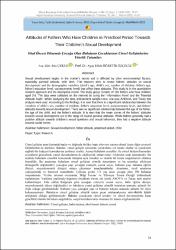Attitudes of fathers who have children in preschool period towards their children's sexual development
Künye
Uzkul, S. & Öğretir Özçelik, A. D. (2023). Attitudes of Fathers Who Have Children in Preschool Period Towards Their Children's Sexual Development . Afyon Kocatepe Üniversitesi Sosyal Bilimler Dergisi , 25 (1) , 74-87 . DOI: 10.32709/akusosbil.1079384Özet
Sexual development begins in the mother's womb and is affected by other environmental factors,
especially parental attitude, with birth. This research aims to reveal fathers' attitudes on sexual
development and the demographic variables (child’s age, child’s sex, number of children, father's age,
father's education level, socioeconomic level) that affect these attitudes. This study is in the quantitative
research approach and the descriptive model. The study group consists of 190 fathers who have children
aged 3-6. The data were collected on the internet by using the 'Information Form' and the 'Parental
Attitude Scale'. While analyzing the data, independent sample t-test, one-way ANOVA, and Tukey test
analysis were used. According to the findings, it is seen that there is a significant relationship between the
variables of child’s sex, number of children, father's education level, socioeconomic level, and fathers'
attitudes towards sexual development. There was no significant relationship between the age of the father,
the age of the child, and the father's attitude. It is seen that the mean scores of the fathers' attitudes
towards sexual development are in the range of neutral-positive attitudes. While fathers generally had a
positive attitude towards children's sexual questions and sexual behaviors, they had a negative attitude
towards social norms. Cinsel gelişim anne karnında başlar ve doğumla birlikte başta ebeveyn tutumu olmak üzere diğer çevresel faktörlerden de etkilenir. Babalar, cinsel gelişim sürecinde çocuklarına rol model olurlar ve çocukların sağlıklı bir özdeşim kurmalarına yardımcı olurlar. Ayrıca babaların çocukları ile cinsel iletişim kurmaları çocukların gelecekteki cinsel davranışlarını da etkileyerek onları cinsel risklerden uzak tutmaktadır. Bu nedenle babaların cinsellik konusunda iletişime açık olmaları ve olumlu bir tutum sergilemeleri oldukça önemlidir. Bu araştırma, babaların cinsel gelişime yönelik tutumlarını ve bu tutumları etkileyen demografik değişkenleri (çocuğun yaşı, çocuğun cinsiyeti, çocuk sayısı, babanın yaşı, babanın eğitim düzeyi, sosyoekonomik düzeyi) ortaya çıkarmayı amaçlamaktadır. Araştırma, nicel araştırma yaklaşımında ve betimsel modeldedir. Çalışma grubu 3-6 yaş arası çocuğu olan 190 babadan oluşmaktadır. Veriler internet ortamında, 'Bilgi Formu' ve 'Ebeveyn Tutum Ölçeği' kullanılarak toplanmıştır. Verilerin analizinde bağımsız örneklem t-testi, tek yönlü ANOVA ve Tukey testi analizi kullanılmıştır. Elde edilen bulgulara göre çocuğun cinsiyeti, çocuk sayısı, baba eğitim düzeyi, sosyoekonomik düzey değişkenleri ve babaların cinsel gelişime yönelik tutumları arasında anlamlı bir ilişki olduğu görülmektedir. Babanın yaşı, çocuğun yaşı ve babanın tutumu arasında anlamlı bir ilişki bulunamamıştır. Babaların cinsel gelişime yönelik tutum puan ortalamalarının nötr-olumlu tutum aralığında olduğu görülmektedir. Babalar çocukların cinsel soruları ve cinsel davranışlarına karşı genellikle olumlu bir tutum sergilerken, sosyal normlara karşı olumsuz bir tutum sergilemişlerdir.
Kaynak
Sosyal Bilimler DergisiCilt
25Sayı
1Bağlantı
https://dergipark.org.tr/tr/pub/akusosbil/issue/76372/1079384https://hdl.handle.net/11630/10658
Koleksiyonlar
- Cilt 25 : Sayı 1 [25]



















